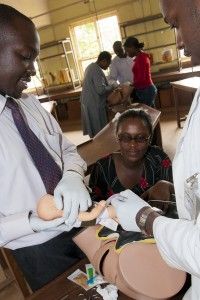
The complexities of maternal and neonatal mortality and morbidity are being addressed by many stakeholders. The Canadian Network for International Surgery which works mainly in sub-Saharan Africa focusses on skills training of clinical associates (clinical officers, nurse midwives and assistant medical officers) as well as medical students and obstetrical residents at the pre-service stage of their careers. The CNIS volunteers include both surgeons and obstetricians as well as family doctors, emergency physicians and nurses.
The Clinical officers and nurse midwives receive the Fundamental Intervention, Referral and Safe Transfer (FIRST) Course which is laboratory-based. Medical students and assistant medical officers take the Essential Surgical Skills (ESS) course, which includes a full day of obstetrics. The ESS course prepares these learners for the Structured Operative Obstetrics Course (SOO). This course links simulation in the laboratory to the operating room. In the skills lab, the operative management of cervical laceration, retained products of conception, retained placenta and a ‘skin to skin’ caesarian section are practised. The caesarian section model is a CNIS innovation. Learning to perform C-section on a model moves the student’s skills up the learning curve and prepares them for actual cases. Following this practice the learner is required to successfully perform six caesarian sections under supervision. Ten to 12 learners participate in the course at any one time. As of this point more than 750 African students have completed both ESS and SOO.
This CNIS focus is appropriate for a surgical development organization because in sub-Saharan Africa the majority of caesarian sections in rural areas and many in urban locations are performed by assistant medical officers, general practitioners and surgeons. There is a huge unmet need for this procedure which is crucial in the prevention of fistula and the management of the major causes of maternal and neonatal mortality including antepartum & post-partum hemorrhage, severe pre-eclampsia & eclampsia, sepsis and obstructed labour. There is also a huge unmet need in the training of practitioners in this procedure. CNIS and several other organizations are addressing basic emergency obstetrics and neonatal care. However, few organizations are trying to address advanced obstetrics and those that are teaching caesarian section are having difficulty achieving sufficient output to successfully address the unmet need for this procedure. The CNIS strategy of structured clinical training with laboratory experience linked to formal supervised surgery has a moderately high output which is sufficient to contribute to this unmet need. Internal and external evaluations have confirmed that the training is effective.
CNIS is open to helping other organizations that are concerned about the unmet need for caesarean section training in order to overcome the unmet provision of caesarean section services in many countries.